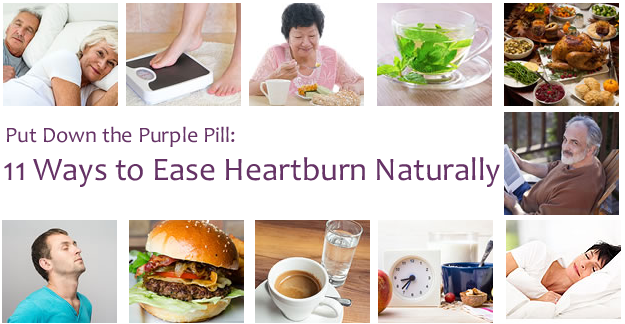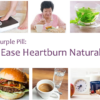When you get a burning feeling in your stomach after eating a meal (GERD) is your first reaction to head to the medicine cabinet and pop a pill for relief? If so, you may want to think twice about using them often as you can likely see better results, without the side effects from drugs, with a combination of dietary and lifestyle changes, as well as some natural remedies.
GERD (gastroesophageal reflux disease), or acid reflux, is a condition in which stomach acid backs up into your esophagus on a persistent and regular basis, causing heartburn and other symptoms. (Note: Many people refer to heartburn as acid reflux and vice versa, but technically heartburn is the symptom that occurs when acid splashes out of your stomach). Prilosec and Prevacid can get rid of the problem, but those types of drugs can block the absorption of calcium and Vitamin A. After using them it’s common for GERD to return even stronger (called a rebound effect) leading to using these drugs more and more often.
Heartburn can be relieved or prevented with not-so-difficult dietary modifications and lifestyle tweaks. Read on for nutritionists’ best advice to feel better and alleviate that roiling sensation in your chest today — maybe even for good.
[metaslider id=11241]
1. Don’t eat close to bedtime to ease GERD
“Eating too close to bed can interfere with normal digestion, triggering reflux as you lie down,” says Erin Palinski-Wade, RD, CDE, author of Belly Fat Diet For Dummies. Giving yourself an ample window between supper and sleep allows acid levels in your stomach to go down. When you’re feeling hungry late at night, it’s often your body giving you a signal that you’re tired. Hit the pillow instead, and you’ll likely wake up glad you did, without any late-night munchies regret.
2. Chew your food consciously, and thoroughly
The Nutrition Twins, Lyssie Lakatos, RDN, CDN, CFT and Tammy Lakatos Shames, RDN, CDN, CFT, authors of The Nutrition Twins’ Veggie Cure, recommend chewing each bite 20 times. If that sounds unbearable, at least shoot for 5 to 10 and focus on mindfully eating your food (that means no TVs or smartphones distracting you!). “This will prevent the speed eating that leads to indigestion and it also will help to better digest your food. Digestion starts in the mouth as saliva is excreted and food is mixed with digestive enzymes and probiotics which aid in digestion,” they say.
3. Drop just a few pounds
Research shows that overweight and obese people are more likely to suffer from GERD, so losing even a few pounds can make a difference. “Consider a diet emphasizing whole plant foods to maximize quality of your diet and nutrient density while decreasing overall caloric intake, which helps promote easy weight management,” says Julieanna Hever, author of The Vegiterranean Diet. Most people know what triggers their own heartburn. It sounds simplistic, but don’t eat those foods.
4. Skip the peppermint tea
It may give you fresh breath and sound like a comforting ritual, but you want to think twice before you fire up the tea kettle. “You wouldn’t think of it as a heartburn trigger, but peppermint relaxes the sphincter muscle between the stomach and esophagus. When this happens, stomach acids can reflux back into the esophagus, causing discomfort,” says Palinski-Wade. A better option? Ginger tea, she says. “Ginger has been associated with improved digestion and may improve the symptoms of reflux.” Sipping ginger tea in the evening may reduce nighttime heartburn symptoms.
5. Don’t feast like you’re at a medieval banquet
Or any kind of banquet, for that matter. “Eating until we are stuffed causes heartburn because there’s less room for expansion of gases to digest food properly, says nutritionist Lisa DeFazio, MS, RDN. Without this extra space heartburn — or the urge to vomit — is a result. “Remember that your stomach is approximately the size of your fist and you only need to consume about that much food to reach satiety,” Hever reminds us. After a meal, stay upright for at least 20 to 30 minutes to enable food to pass through the stomach. You can also try going for a walk post-meal.
6. Dress for comfort
Tight-fitting clothing puts pressure on the abdomen, and the pressure can push stomach contents up into the esophagus, explains Lisa Hayim, registered dietitian and founder of The Well Necessities.
7. Don’t worry, be happy
“When you eat while stressed, it leads to speed eating, less chewing, and interrupted digestion. Stress also weakens the sphincter that keeps food in the stomach and prevents it from coming up into the esophagus,” say The Nutrition Twins. Find ways to lower your stress, such as by taking a quick walk outdoors for a breath of fresh air. Others may enjoy a quick yoga sun salutation sequence to introduce a dose of tranquility into an otherwise harried day. Conversely, “deep breathing stimulates the parasympathetic nervous system and brings on relaxation.” Before and after meals, try some breathing exercises: Breathe in through your nose for 8 counts, hold it in your lungs for 8 counts, and slowly breathe out through your mouth for 8 counts.
8. Limit caffeine to ease GERD
That espresso machine or afternoon pick-me-up iced coffee may beckon, but heed this: “Caffeine relaxes the lower esophageal sphincter, the muscle responsible for pushing the contents of the food downwards,” says Hayim. Try to note when you feel heartburn symptoms and see if you can link it to that late-afternoon coffee fix. Other foods and beverages may have the same reflux-stimulating effect, including alcohol, spicy foods, peppermint, and acidic foods such as tomatoes and citrus,” adds Hever.
9. Eat small, regular meals to fight GERD
Bigger meals put more pressure on the sphincter that helps to keep food down. By keeping meals modest, there’s less pressure and less chance that food or stomach acid will reflux, explain The Nutrition Twins. Instead of three large meals, experiment with smaller, more frequent ones and see if it helps ease heartburn.
10. Cut the fat
We need fat to survive, and good fats (monounsaturated fats like in nuts, olive oil and avocados, for example) are heart-healthy. But pay attention to possible over-consumption of this macronutrient if you suffer from heartburn. “Eating meals rich in fat, especially before laying down, can increase the risk of heartburn. Fat slows down digestion, which leads to food remaining in the stomach for a longer period of time, where it can increase pressure on the esophageal sphincter and make heartburn more likely,” explains Palinski-Wade.
11. Elevate your head when you sleep of you have GERD
Use gravity to ease heartburn. We’re not talking falling asleep in a recliner, but a propped-up upper body does help ease heartburn by keeping food from sliding up and pushing against your lower esophageal sphincter, explain The Nutrition Twins. Use several pillows, or look for a foam wedge that can be placed under your mattress.






